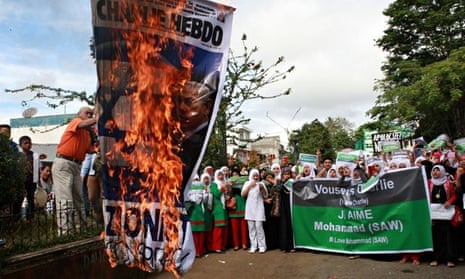A Charlie Hebdo poster was burned in the Philippines on Monday as 1,500 people staged a protest march against the depiction of the prophet Muhammad on the cover of the magazine a week after the deadly attack on its offices.
The publication of the “survivors’ issue” of the weekly on Wednesday caused ructions in the Muslim world where the paper was accused of reckless provocation and insulting the prophet.
Muslim leaders lined up to condemn Charle Hebdo for its decision to put a cartoon of the prophet on the cover and warned that it risked fuelling sectarian tensions. The press in most Muslim countries did not publish the cover cartoon and a Turkish court banned the cartoon from being released on Turkish websites. But the arch-secularist Turkish newspaper Cumhuriyet published a four-page segment containing the controversial Luz caricature as well as other articles and caricatures from the special issue.
The cover of the French magazine shows a weeping prophet holding up a sign saying “Je suis Charlie” (“I am Charlie”), the slogan of global solidarity with the magazine’s journalists who were killed in their offices last Wednesday. The headline reads “All is forgiven”.
In the past, Charlie Hebdo’s repeated satirisation of the prophet has been condemned in France and around the world. In November 2011, the magazine’s offices were firebombed after the publication of a book satirising Muhammad.
But the journalists have justified their decision to lampoon the prophet again.
The paper’s lawyer, Richard Malka, told French radio: “If you hold up the banner ‘Je suis Charlie’ that means you have the right to blaspheme, you have the right to criticise my religion.”
However, in the Philippines, organisers of a protest march in the mainly Muslim southern town of Marawi, said that “freedom of expression does not extend to insulting the noble and the greatest prophet of Allah”. Some protesters raised their fists as the poster was burned.
In France, Muslim leaders appealed for calm after the cover of the magazine’s special edition, which was an instant sellout on Wednesday with long queues forming at newsstands across France, was leaked ahead of publication.
Muslims interviewed by French media expressed concern about the impact on their community.
“They’re free to publish what they like but it affects us, it’s going to hurt us a lot,” a Muslim woman identified as Salya told France Info radio in Clichy-la-Garenne, a Paris suburb inhabited by many Muslims originally from north Africa.
Among those who warned that Charlie Hebdo would “stir up hatred” was the Cairo-based Islamic research centre at Al-Azhar, the Muslim world’s foremost authority, as well as the Qatari preacher Yusuf al-Qaradawi.
The Egyptian grand mufti, the most influential Muslim cleric in the country, and the grand mufti of Jerusalem, also condemned the cover.
The Iranian foreign ministry spokeswoman, Marzieh Afkham, warned that the cartoon provoked Muslims “and could fan the flame of a vicious circle of extremism”.
Dozens of British imams urged Muslims to react with restraint to Charlie Hebdo’s depictions of the prophet.
In a 10-point advice sheet issued by the Muslim Council of Britain, which was signed by more than 50 Muslim leaders, the imams urged Muslims to express their “justified displeasure at the mockery that is made of our faith” in a peaceful manner.
The council added that depictions of the prophet “cannot tarnish his image”.
Sara Khan, co-director of the counter-extremism and women’s rights group Inspire, told BBC Radio 4’s Today programme that the cover picture was “not an image of anger on behalf of Charlie Hebdo” and “not a provocation”.
Copies of the special issue will be available in an English-language version in Britain from Friday.
